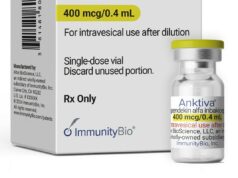Angion Biomedica announced positive phase II clinical trial results for its drug ANG-3777, which treats acute kidney injuries. The study tested whether the small molecule could help kidney transplant patients suffering from delayed graft function, during which a transplanted kidney does not perform properly. The results were presented at the American Society of Nephrology Kidney Week at the group’s annual meeting in Washington, D.C.
The 28-patient study showed ANG-3777 improved kidney function, based on patients’ estimated glomerular filtration rate (eGFR), a key renal function metric. The drug also boosted urine output, caused no adverse events and may have reduced transplant failures.
“There were two graft failures in the placebo arm and none in the drug arm,” said Angion President and CEO Jay Venkatesan in a phone interview. “But, in fact, there were twice as many patients in the drug arm. That the graft actually survived longer is clearly a positive. If we can show that in the Phase 3, that would not just be a home run, that would be a grand slam because nobody’s ever been able to show that.”
Though ANG-3777 could have wider applications, Angion took a note from the Food & Drug Administration (FDA), which suggested they test it against delayed graft function. After a kidney is removed from a deceased donor, it often goes several hours without blood flow, which can damage the organ. The renewed blood supply after transplant can also cause damage.
“Because currently there are no treatment options for this condition, patients are given dialysis until their kidney recovers,” Venkatesan said. “If the kidney doesn’t recover, there’s really nothing they can do.”
ANG-3777 is a small molecule hepatocyte growth factor (HGF) mimetic designed to activate the HGF receptor, also called c-Met, which in turn activates an organ’s ability to heal itself. HGF is the molecule that allows livers to regenerate after parts have been removed. By continuing to activate c-MET after the body’s normal HGF complement is exhausted, ANG-3777 could potentially boost the organ’s healing abilities.
This strategy differs from previous efforts to combat delayed graft function. Alexion’s Soliris failed to effectively treat the condition. Quark pharma’s QPI-1002 is currently in Phase 3 trials. Both of these agents target inflammation. Angion is banking that activating the regenerative pathway will be a better choice.
“Most approaches have tried to block bad actors,” Venkatesan said. “They try to block the compliments; they try to block an inflammatory cytokine. The problem with that approach is you either need to do it prophylactically or you need to intervene very early before the whole downstream inflammatory effect occurs. We don’t take that approach, and so we’re able to actually work after the injury has occurred.”
In addition to delayed graft, Angion is testing ANG-3777 in patients with chronic kidney disease who develop acute kidney injuries from cardiac surgery, a larger patient population. Another drug, ANG-3070, is poised to enter clinical trials to reduce kidney and lung fibrosis.
The company is now enrolling 242 patients in the pivotal phase 3 trial for ANG-3777 and hopes to see results in 2020.
“We expect to finish enrolling the phase 3 studies sometime in the first quarter of next year,” said Venkatesan. “We’ll have data in the second half of next year.”
Picture: Hollygraphic, Getty Images








